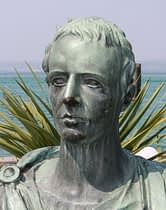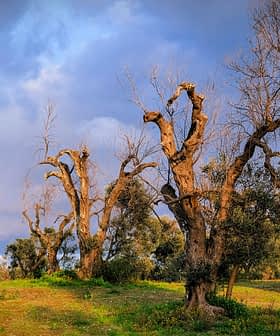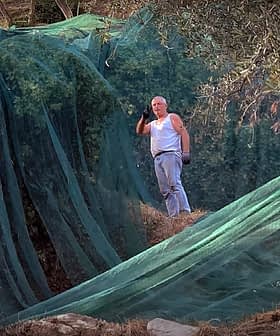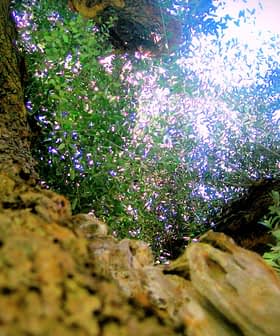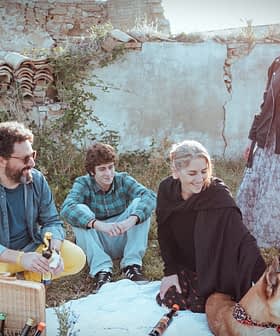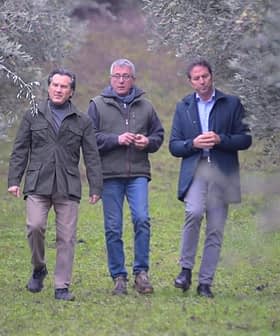New Casaliva from "Grotto of Catullus" will be Pure Poetry
The Grotto of Catullus, a Roman era villa in northern Italy, will be producing traceable extra-virgin olive oil from its ancient olive groves in Sirmione, located on Lake Garda. The project is funded by a grant from the European Union and Italian government, with the goal of preserving the landscape of the archeological site for years to come by reclaiming and cultivating the olive groves.
By Lucy Vivante
Olive Oil Times Contributor | Reporting from Rome
Grotto of Catullus – Lake Garda Archeological Site to Produce Traceable Extra-Virgin Olive Oil
The Grotto of Catullus, the largest Roman era villa in northern Italy, will now be producing extra-virgin olive oil from its ancient olive groves. The site has belonged to the Italian government since 1948 and is in Sirmione, a town and peninsula that juts out into Lake Garda. The 7 hectare property (17 acres) has some 1,500 olive trees and the villa structure itself covers 2 hectares (almost 5 acres). It is one of Italy’s most visited archeological sites.
 AIPOL, the Association of Inter-Provincial Olive Growers of Lombardy, was asked by the government’s Ministry for Patrimony and Cultural Affairs and the Superintendence of Archeological Patrimony in Lombardy, who jointly manage the site, to reclaim the olives which had not been tended for years. A grant from the European Union, along with Italian government monies, funds the 2010 – 2012 project.
AIPOL, the Association of Inter-Provincial Olive Growers of Lombardy, was asked by the government’s Ministry for Patrimony and Cultural Affairs and the Superintendence of Archeological Patrimony in Lombardy, who jointly manage the site, to reclaim the olives which had not been tended for years. A grant from the European Union, along with Italian government monies, funds the 2010 – 2012 project.
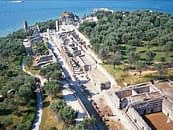 The name Grotto of Catullus is often seen in quotations. This is because it is neither a grotto nor did it belong to Catullus. “Grotto” comes from the fact that the villa had been in ruins and the collapsed building recalled grottoes to Renaissance eyes. While Catullus did have a villa in Sirmione, and wrote about it in his poetry, it is unlikely to have been this one. The present villa is from the first century of the Common Era and Gaius Valerius Catullus lived from c. 84 — 54 BCE. However, recent excavations have found an earlier villa under the southern end of the present structure, so the matter is not closed. Later poets such as Tennyson, Carducci, and Pound visited Sirmione and wrote of Catullus and the place.
The name Grotto of Catullus is often seen in quotations. This is because it is neither a grotto nor did it belong to Catullus. “Grotto” comes from the fact that the villa had been in ruins and the collapsed building recalled grottoes to Renaissance eyes. While Catullus did have a villa in Sirmione, and wrote about it in his poetry, it is unlikely to have been this one. The present villa is from the first century of the Common Era and Gaius Valerius Catullus lived from c. 84 — 54 BCE. However, recent excavations have found an earlier villa under the southern end of the present structure, so the matter is not closed. Later poets such as Tennyson, Carducci, and Pound visited Sirmione and wrote of Catullus and the place.
Gaius Valerius Catullus was born in nearby Verona, but spent most of his short life (he died at about age 30) in Rome. He is best known for his love poems written about Clodia Metelli, known as Lesbia in the poems. Catullus was one of the earlier native Italian poets to follow a variety of Greek models, both in his erotic and vituperative poetry, as well as in a beautiful longer narrative poem, really a mini-epic in the fashionable Alexandrian style, that tells of the marriage of Peleus and Thetis, the parents of Achilles, and the abandonment of Ariadne by Theseus on the island of Naxos. Teachers of Latin have often relied on Catullus’s erotic and obscene work to hold the interest of their students.
Silvano Zanelli, president of AIPOL said, “The reclamation and cultivation carried out this year on the ancient olive grove will produce AIPOL traceable extra-virgin olive oil, of the Casaliva variety.” Zanelli added that his organization’s work “will preserve for years to come the landscape that for centuries has characterized the archeological area of the Grotto of Catullus and the northernmost section of the Sirmione peninsula.” Casaliva variety olives produce delicate and fruity oils. The variety is commonly grown in Lombardy and other north Italian regions.


